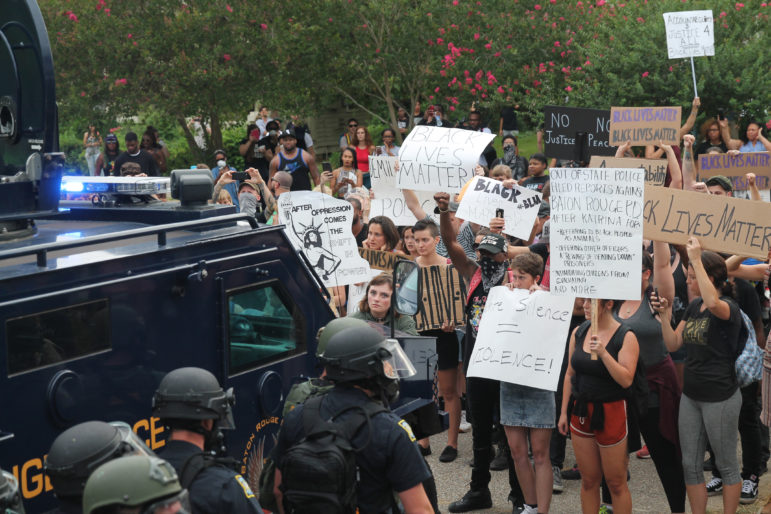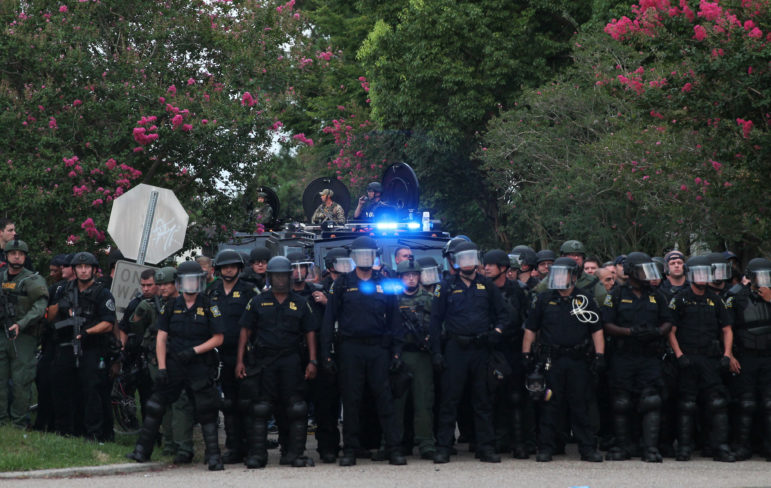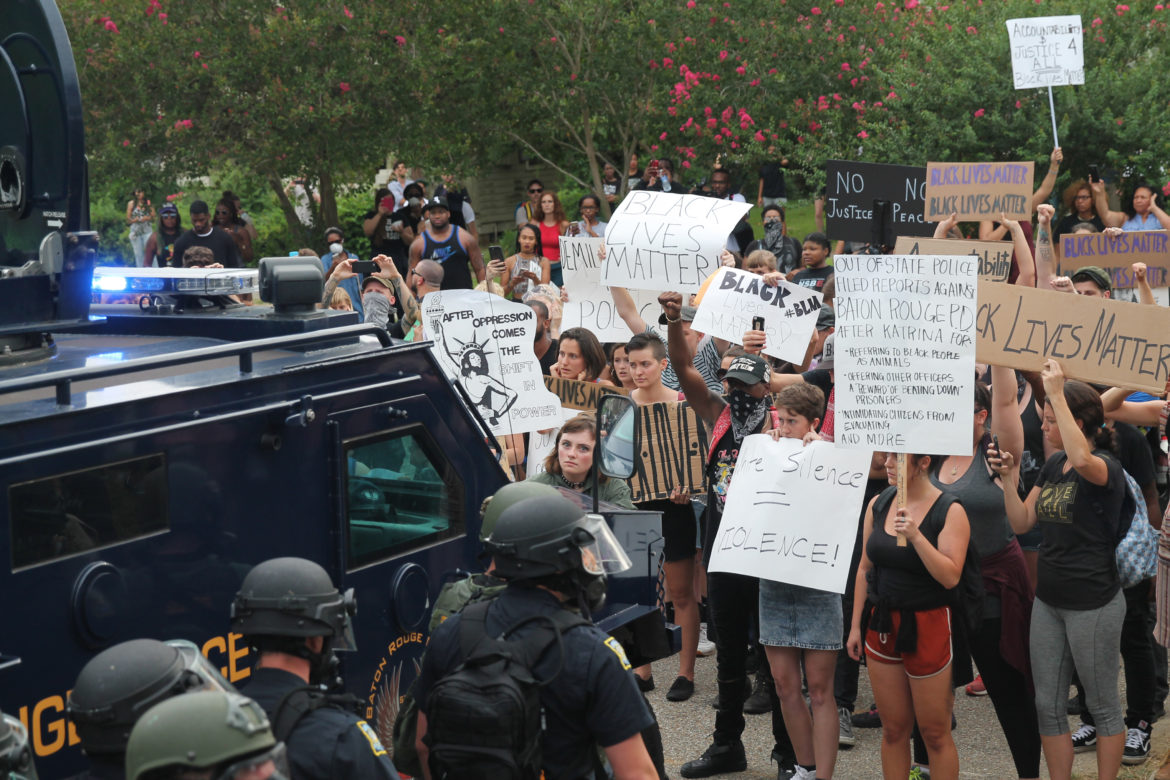
Photos by Karen Savage
An armored vehicle pushing into protesters in Baton Rouge on July 10, 2016. Protesters are calling for justice for Alton Sterling, who was killed by Baton Rouge police on July 4, 2016.
NEW YORK — An independent U.N. expert on human rights issued a blistering statement on the status of protest and policing in the United States after touring the country and visiting cities recently embroiled in unrest in the wake of racially tinged police killings, including Baltimore; Ferguson, Missouri; New York and Baton Rouge, Louisiana.
The expert, Maina Kiai, the Special Rapporteur on the rights to freedom of peaceful assembly and of association, found in a preliminary report that the United States is falling short of its ideals and its constitutional guarantee of the right to peaceably assemble.
 “Today, unfortunately, America seems to be at a moment where it is struggling to live up to its ideals on a number of important issues, the most critical being racial, social and economic inequality, which are often intertwined,” Kiai said in his statement, while acknowledging the country’s long history of racial oppression.
“Today, unfortunately, America seems to be at a moment where it is struggling to live up to its ideals on a number of important issues, the most critical being racial, social and economic inequality, which are often intertwined,” Kiai said in his statement, while acknowledging the country’s long history of racial oppression.
Special rapporteur positions are honorary. Experts are appointed by the UN Human Rights Council to investigate alleged human rights violations.
Kiai released the report amid news of prosecutors in Baltimore dropping the remaining cases against the police officers initially charged in the killing of Freddie Gray, and as some residents demand policy changes for Baton Rouge police officers. Residents say they intend to continue to push for the arrest and prosecution of officers responsible for Alton Sterling's death.
Kiai echoed what many critics of law enforcement practices in the United States have said in the wake of violent police responses to peaceful protests: He warned about the harm the federal government’s 1033 program has done in encouraging a militarized approach. The program gives local police departments access to military equipment.
“It is ill-advised to use military material to manage activities so fundamental to democratic societies. Protests naturally come with some disruptions, but police should target only the individuals responsible for violence,” Kiai wrote. “This is not only a violation of the right to peaceful assembly, it [is] also dangerous for participants, the general public and police officers.”

Three armored vehicles following a line of police down a Baton Rouge street during the protest. Protesters are calling for justice for Alton Sterling, who was killed by Baton Rouge police on July 4, 2016.
In addition, “assemblies organized by African-Americans are managed differently, with these protests often met with disproportionate force. Indeed, white and Muslim activists that I met acknowledged that black fellow protesters face harsher police encounters in the context of assemblies: police are more likely to be militarized and aggressive; black people are detained longer after arrests; they face more and heavier charges, more intimidation and more disrespect,” the report says.
On July 10, the kind of overmilitarization Kiai cited in his report played out in Baton Rouge when police officers and state troopers responded to peaceful protesters calling for justice for Sterling with an armored vehicle, wearing riot gear. Police pointed guns at protesters, rounded up dozens of people and threw them in prison, including a JJIE reporter. Many of those arrested, including reporters and legal observers, have since said they were imprisoned on false charges. In response to a request by Baton Rouge residents and protesters, Kiai added a stop in Baton Rouge to his agenda.
“It was disconcerting to hear the many testimonies revealing that two years after the mismanagement of protests in Ferguson, and a year after the crisis in Baltimore following the [death] of Freddie Gray, similar practices were repeated in Baton Rouge in July this year to deal with protests after the police shooting of Alton Sterling,” Kiai said.]
The Baton Rouge Police Department declined to comment on the report.
A number of civil rights organizations in Baton Rouge have filed lawsuits against the Baton Rouge Police Department, East Baton Rouge Parish Sheriff’s Office, Louisiana Department of Public Safety, the Louisiana State Police and several city and state officials for wrongful arrests and crushing protesters rights during the protest.
Crystal Williams, 28, founder and lead organizer for North Baton Rouge Matters, a community group formed in the wake of Sterling’s death, said Sterling’s death and the violent treatment of protesters should come as no surprise.
“Systematic racism is still running rampant in North Baton Rouge,” she said.
In his statement, Kiai emphasized that “Black Lives Matter” does not imply that other lives don’t matter.
“The Black Lives Matter movement is simply a reaffirmation that black lives do in fact matter, in the face of a structure that systematically devalues and destroys them,” Kiai said. “It is about a historically and continuously targeted community seeking to elevate itself to the same level that everyone else enjoys.”
Kiai is expected to issue a full report to the Human Rights Council in June 2017. Williams is hopeful but cautious.
“We don’t put high expectations in the judicial system because of the track record in America — no one is held accountable,” she said.
Among those who testified during the meeting with Kiai in Baton Rouge was Victor White, father of Victor White III. The younger White was in the back of an Iberia Parish police vehicle with his hands cuffed behind his back when he died of what was ruled a self-inflicted gunshot wound to the chest. After investigations, both federal and state officials declined to press charges.
“It’s absolutely ridiculous. The message is clear that when police put on that badge and uniform and use a department-issued gun, they will not be held responsible,” Williams said.
